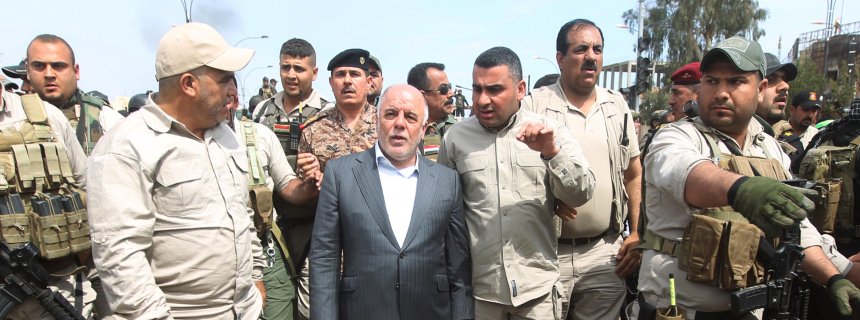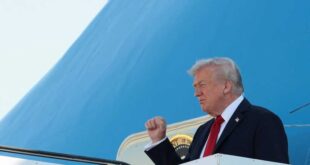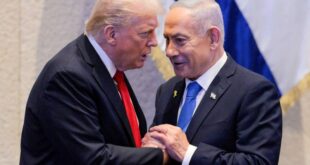By Susanne Koelbl in Baghdad
In a SPIEGEL interview, Iraqi Prime Minister Haider al-Abadi discusses his disappointment over delayed American support in Baghdad’s battle against the Islamic State and why it remains so difficult to prevail over the terrorist organization.
Iraqi Prime Minister Haider al-Abadi, 62, sits on an armchair in his office in Baghdad. He’s wearing a crumpled suit and, in contrast to his authoritarian predecessor Nouri al-Maliki, he comes across as an amiable man. Al-Abadi grew up in Baghdad, the scion of upper class families. He studied electrical engineering in Baghdad and later in Manchester, England. He’s a member of the Shiite Dawa party, which opposed former dictator Saddam Hussein, and he had to live in exile in Britain for decades. Al-Abadi only returned to Iraq in 2003 after the toppling of Hussein. At the time of our interview, the Iraqi army was in the middle of a battle against the Islamic State in Tikrit. We were only 14 minutes into the discussion when a sheet of paper was handed to the prime minister and he left to go into an adjoining room. “We’re in the middle of war,” his office director then said. “I have no idea if he will come back.” After 42 minutes, the 62-year-old prime minister returned, asking: “What do you want to know?”
SPIEGEL: Mr. Prime Minister, you are just returning from the front lines, where you happily announced that the city of Tikrit has been freed from the Islamic State (IS) terrorist militia. Will Iraqi fighters be able to eliminate this extremist force from your country’s soil?
Al-Abadi: The liberation of Tikrit is very encouraging. However, Daesh (the Arab acronym for Islamic State) remains a major threat — not only for Iraq, but also for the whole world. They keep on recruiting people, they have huge financial resources and, honestly, a uniformed army alone cannot face it on its own.
SPIEGEL: Vast parts of your country are still under siege, including the Anbar province and Mosul, Iraq’s second largest city. What’s your strategy?
Al-Abadi: At this moment we have many brave fighters from Anbar itself who are very determined to liberate Fallujah and all of their cities.
SPIEGEL: IS, or Daesh, is strongest in predominantly Sunni populated areas, where many people oppose the government in Baghdad and either support or join the Islamic State.
Al-Abadi: Last summer, Daesh rolled into Iraq and took over cities without a fight. This was aided by their use of psychological warfare against us. Daesh is a vicious and criminal terrorist organization. They rely on atrocities and fear to feed their war. But now these tactics are no longer working for them — we have overcome all of those ploys. The fight in Anbar province, in Fallujah, which is now being led by Iraqi fighters, is for the people of Fallujah. The psychological war is now against Daesh, not against us.
SPIEGEL: Can you confirm that the provincial government in Mosul received a large amount of money from the Islamic State and in return allowed the terrorists to occupy the city without any resistance?
Al-Abadi: The facts are there, but everybody has their side of the story and is interpreting these facts differently. We are in the middle of a war and everybody is accusing everybody. Each side wanted the other to fail and at the end part of the state failed. We have local governments, a central government and the security forces. Instead of working together to save the day, they worked against each other and it ended up being a zero-sum game, which Daesh took advantage of.
SPIEGEL: Following the army’s collapse in the north, there are still volunteer fighters, Shiites in particular, who are battling IS. What will happen to them if the Islamic State is eventually defeated? Is there a threat of a civil war?
Al-Abadi: There are a lot of dangers that we are not seeing yet, and for which the seeds are now planted. No. 1: When we succeed in driving the terrorists out of the cities and towns, it is most likely they will still have hotspots in Iraq. They will try to agitate the population again. No. 2: We have many thousands of civilians who rose to defend their own country against this terrorist threat. They have arms at their disposal, and they are very powerful because they are ideologically motivated. Honestly, it would be a challenge to deal with this.
SPIEGEL: It is Iran and not the United States that emerged as your most important ally in the battle against IS. Are you disappointed by President Barack Obama?
Al-Abadi: I hoped the support would have been quicker and more effective, especially at the beginning of the assault by Daesh. Baghdad was being threatened by them and, in actual fact, there was no action from the US or anybody else.
SPIEGEL: Do you still trust this strategic partnership?
Al-Abadi: I was very surprised to hear later that the US was anticipating that Baghdad might fall within three days. I don’t think that this assessment was accurate. Baghdad was and remains fortified very well by our security forces. And after Grand Ayatollah Ali al-Sistani issued a fatwa to the civilians to defend the country and the sacred sites, the whole scenario changed. The Iranians were quick and prompt in providing support, in the form of weaponry and advisors. Iran regards Daesh as a national security threat that had reached their borders. As such, they reacted promptly.
SPIEGEL: What political price will you have to pay for Iran’s solidarity?
Al-Abadi: I don’t owe them anything. They are doing it for their own national security. Daesh is a great threat to Iran as well. Even if I displeased them now, the Iranians would continue supporting us. It is also very clear that Iran did not dictate the formation of my government. The Iraqis can and are implementing their own will.
SPIEGEL: The transfer of power from your controversial predecessor, Nouri al-Maliki, to you was largely orchestrated by the Americans. Many would argue that Iraq is in fact governed by the US and Iran.
Al-Abadi: That’s absolutely wrong. Similarly to any government in the world, when we make decisions, we have to take our political partners into account. My problem is not Iran or the United States, but with proxies.
SPIEGEL: Are you referring to unofficial fighting groups like the Iranian Revolutionary Guard or the Shiite Hezbollah from Lebanon that are fighting alongside the Iraqi army?
Al-Abadi: I am not denying this. But the US also has its proxies. I welcome support by any country to Iraqis fighting against Daesh. I would also like to strengthen the bilateral relationship with our neighbors, but having either their troops on the ground or having their air force taking part in a fight inside Iraq can complicate things. I do not want to end up having fighting on Iraqi soil by these differing neighbors of Iraq, which will cancel out the whole effort.
SPIEGEL: What are your choices?
Al-Abadi: There are many countries that want to help Iraq. The Iranians have offered to provide their air force, as have the United Arab Emirates, Jordan and Turkey. But with my utmost respect to them, they all have their own interests. So I would rather concentrate on the international coalition. This way it is easier to manage because there are no conflicting interests, like some “neighborly” interests, and they are not going to support one group against another inside Iraq.
SPIEGEL: In a couple of days, on April 14, you plan to meet with President Obama in Washington. What do you want to come back with?
Al-Abadi: There are a number of issues we would like to raise in our visit, namely continued military and security support. Finally, on our request, the Americans have bombarded some targets in Tikrit. It is this kind of support and much more that we will have to discuss and coordinate in the future.
SPIEGEL: What kind of support in the battle against IS do you expect from Germany?
Al-Abadi: The Germans can play a major role in this. They have the weapons we need, especially anti-explosives devices. Wherever Daesh is, they lay a lot of mines and explosive devices in the ground. Our soldiers have to remove them with their own bare hands. This is resulting in a lot of casualties. This has also delayed our advancements. Germany has the technology to remove them safely.
SPIEGEL: Why in particular do you want Germany’s support?
Al-Abadi: There are hundreds of terrorists of German origin who are fighting with Daesh. The good thing is, there is very good cooperation between us and the German foreign intelligence agency. We have provided them with the phone numbers these individuals are using to make calls to Germany.
SPIEGEL: How do the foreign fighters differ from the local ones?
Al-Abadi: Fifty-seven percent of Daesh fighters are Iraqi. But, honestly, when we enter a city with our forces, we ignore them — they don’t stand up and they will run away. It is the 43 percent who are foreign fighters who have been indoctrinated ideologically who have their backs up against the wall. If Daesh continues to recruit so many from other countries, then no army in our region can stand up to it.
SPIEGEL: What do you suggest?
Al-Abadi: This terrorist organization has the know-how to infiltrate the minds of young people. Government security agencies need to take steps to protect them in the same way they trace child pornography networks around the world.
SPIEGEL: Iraq is at war, but it is not the only crisis affecting the country. Many residents of Baghdad use the word “thieves” when they talk about your politicians. How corrupt is your government?
Al-Abadi: We have problems and the way I am dealing with them is to start by admitting them. Corruption is a huge issue. It has to do with the society, which has changed — both during the times of Saddam Hussein’s regime and after. Also, the sanctions had an adverse effect on society in nurturing this culture of corruption. During the 1960s or 1970s, bribery was very rare in Iraq. The number of government employees was very small and usually they were the elite. But then they incorporated millions of people into the government — not to better run the state, but to control the people. We are in the process of implementing a number of processes and procedures that aim to curb the extent of corruption.
SPIEGEL: One of your first actions after you took office was to close the office of your predecessor’s son, who is said to have provided huge government contracts to people who were ready to pay the most for them. Young college graduates claim they had to pay officials $10,000 to $20,000 in order to obtain government jobs. Why should Iraqis have any faith in this government?
Al-Abadi: We need to flip the system. Four years ago, the government tried to stop the corruption at the Passport Office, where people pay $400 to $500 just to get their passport issued. Every day they were arresting so many people and it did not have much of an effect. But if you ease the procedure, for instance making the document available online, it puts an end to it altogether. I don’t want to fill our prisons with people who ask for petty cash while we are facing this major terrorist threat to the country. I want to keep these prisons for the actual criminals who are killing people or for people who are stealing vast amounts of money from the people. I want to change how we run the government in Iraq.
SPIEGEL: Torture seems to be a common practice in Iraqi police prisons. The arrested get hit by hand, cables and sticks until they confess, whether they are guilty or not. What do you do to try to stop this?
Al-Abadi: This is very disturbing to me, and it’s not only happening with the police — it happens as well at the intelligence offices and during the operations of this war. If I find anybody committing torture, I will make them accountable. They are telling me they stop criminals from controlling the country and are protecting the state, that their conscience is clean. I am telling them that they punish suspects who may be innocent. I am not going to judge their conscience. I am going to judge their actions, which are against the law.
SPIEGEL: Random violence has created an endless circle of revenge, especially among Sunnis and Shiites. Are there any prospects for reconciliation?
Al-Abadi: It has to be broken. I am not defending anybody. However, do not forget that while the Americans were controlling Iraq, they knew building a new police force would take some time. But then they very hastily reconstructed the police apparatus, because terrorist attacks had started. In that process they brought back the old police, the old security forces and you know very well what they were doing before. Since then, the Iraqi governments have been challenged with terrorism and criminal acts. No one had the time to question military and security reports. But honestly, I do not believe these reports. I question everything at the moment. I refer them to people I have trust in to check whether there may be a miscarriage of justice. I am setting up committees; I want everything to be revised.
SPIEGEL: A couple months ago the country was at the brink of sectarian war. Does Iraq still stand a chance as a united nation of Sunnis, Shiites and Kurds?
Al-Abadi: I am working hard towards this. But there has been sectarianism for the past 1,400 years and I am not going to be able to change that. At the moment we are moving more toward unification. Shia and Sunni are working together. We are trying to separate what people believe in and what they do. You have the right to believe whatever you want, but you do not have the right to force your beliefs on another nor indeed punish them for theirs.
SPIEGEL: Mr. Prime Minister, we thank you for this interview.
 Geostrategic Media Political Commentary, Analysis, Security, Defense
Geostrategic Media Political Commentary, Analysis, Security, Defense





